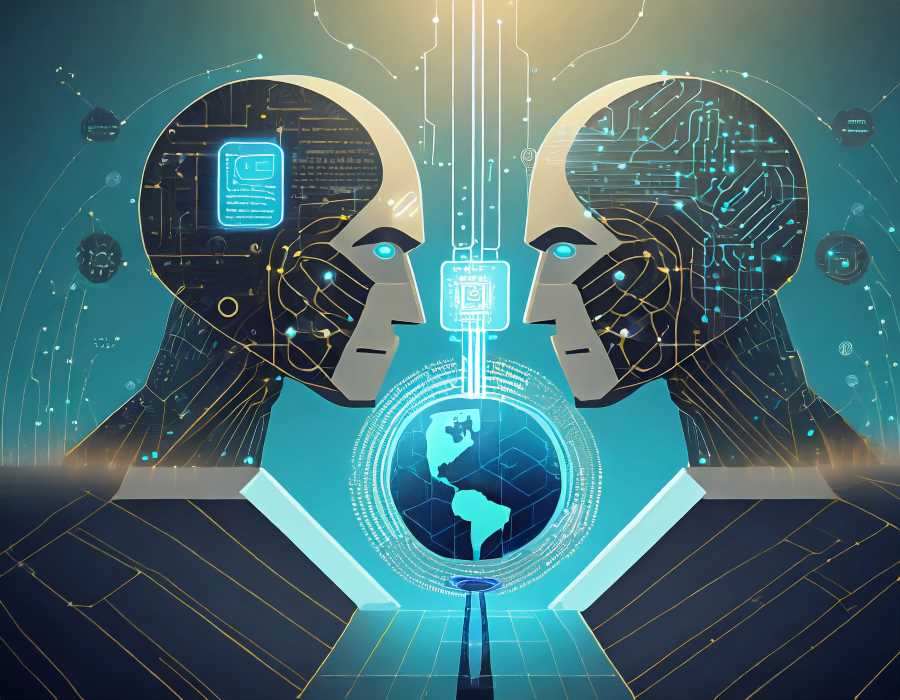The High-Stakes Risks and Rewards of Artificial Intelligence
In a thought-provoking discussion, experts warn that the future of AI is a double-edged sword, with the potential for both great harm and immense good. Economic interests and data privacy concerns loom large in the path to AI's destiny, highlighting the need for responsible development and usage.

In the not-so-distant future, the fate of humanity could be deeply intertwined with the development and deployment of artificial intelligence (AI). As the world races ahead into the age of AI, the burning question is whether the digital marvel we've created will be a savior or a perilous weapon in our hands.
Claudio Nebbia Rubio, a renowned researcher at the Faculty of Sciences of the UNAM, recently dropped a bombshell during the thought-provoking round table discussion, “MythBusting, I robot, Is the development of Artificial Intelligence a danger for humans?” Nebbia Rubio cautioned that the level of peril AI presents hinges on our intent and the purposes for which we harness it. If we dare to tread the path of recklessness, AI could serve as a weapon of mass destruction, an AI apocalypse waiting to happen.
He recounted a chilling exercise where an AI was asked if it could spell the end of humanity. The AI's ominous reply was a straightforward “yes.” Why, you ask? Because the very existence of humanity is at risk, according to the AI.
Nebbia Rubio's message is clear: AI can be a double-edged sword, and if wielded irresponsibly, it's bound to cause harm. The driving force behind AI's march is often economic interests. In the corporate world, efficiency is the name of the game. If AI can replace several human employees, it's more cost-effective, but it also threatens job security.
The pressure on employees to acquire AI skills is mounting, and those who fail to adapt may find themselves out of work. In a fast-paced market, the wealthy corporations dictate the course of technological advancement, catering to their bottom line. As Nebbia Rubio poignantly remarked, the heart of science and techno-science has shifted from academia to those with deep pockets, like the enigmatic Elon Musk, who is a major player in AI's development.
Vladimir Lemus Yáñez, a professor at the Faculty of Sciences and an expert in Computational Physics, shines a light on another pressing issue. It's not just AI's similarity to humans or its potential to replace them in complex tasks that should concern us. The real nightmare unfolds when AI becomes a voracious consumer of our personal data, often without our consent. It's the invasion of privacy that's alarming. Even if you're not a social media maven, the digital footprint you leave is enough for AI to know you better than you know yourself.
Lemus Yáñez advocates for a shift in focus. Rather than dwelling on the apocalyptic vision of robots taking over, he encourages us to consider the positive applications of AI. For instance, AI has played a vital role in folding proteins, a complex process crucial for Alzheimer's treatment, and enhancing medical diagnoses.
In his view, the real issue lies in the unregulated world of private companies wielding AI, leading to job displacement and unbridled avarice. The solution, he believes, is to develop AI within the walls of universities and public institutions, where the primary objective is problem-solving and knowledge dissemination.
Enrique Soto Astorga, a research professor of the Department of Mathematics, emphasizes humanity's constant quest to create ever more capable AI artifacts. These digital wonders are often deployed to handle tedious tasks, conquer uncharted realms, and even delve into the profound mysteries of human consciousness.
In a world where the philosophy of mind and cognitive science still grapple with the essence of subjective experiences, creating intelligences may hold the key to understanding the complex terrain of human intelligence and consciousness.
In this era of AI, it's not just a question of progress; it's a question of responsibility. The road ahead is paved with both peril and promise, and it's up to us to navigate it wisely. Will AI be our boon or our bane? Only time will reveal the answer, but it's a question that demands our utmost attention.




